|
|
|
Sort Order |
|
|
|
Items / Page
|
|
|
|
|
|
|
| Srl | Item |
| 1 |
ID:
166433
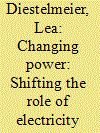

|
|
|
|
|
| Summary/Abstract |
One of the pressing legal questions of the energy transition is how to integrate “prosumers”, consumers who start producing electricity, in the electricity market. So far, their influence remains limited or fully absent because their role as independent market participants is barely or not facilitated as they are usually subject to regulated remuneration schemes. Blockchain technology offers changing the approach of “integration in the market” into “becoming the market” by enabling peer-to-peer transactions. Currently, transactions are facilitated by third parties, suppliers and system operators, whose main task is centrally compiling and coordinating information on loads and generation and contracting supply and distribution services. Instead, blockchain technology enables new ways of organising decentralised persons without the immediate need for one centrally connecting entity. This implies profound legal- and policy consequences. Based on information on first use cases of blockchain applications in the electricity sector, this article identifies those main policy implications for EU electricity law and thereby adds to the discussion how blockchain technology could facilitate “prosumers” to develop as independent market participants in the electricity sector from an energy law perspective.
|
|
|
|
|
|
|
|
|
|
|
|
|
|
|
|
| 2 |
ID:
145677
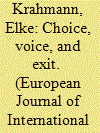

|
|
|
|
|
| Summary/Abstract |
Promoting Private Security Company (PSC) self-regulation has become a key focus due to high profile scandals during the military interventions in Iraq and Afghanistan. Related efforts include the Montreux Document, the International Code of Conduct for Private Security Service Providers (ICoC), American National Standards Institute/ASIS certification, and the new International Standards Organization (ISO) Management System Standard for Private Security Operations. Implicit in industry self-regulation, however, is the assumption that the consumers of private security services will help facilitate and enforce professional standards by shifting their custom to PSCs which have signed up to these codes of conduct or certification schemes. This article investigates the validity of this assumption with regard to government contracting. To what degree are public agencies able – and willing – to let professional standards guide their contracting behaviour? To answer this question, this article develops a general framework for the analysis of public consumer influence through choice, voice, and exit which draws on insights from microeconomics and Albert Hirschman’s classical treatise Exit, Voice, Loyalty. Taking the United States government as an illustrative example, the analysis observes several obstacles to encouraging security industry self-regulation through consumer power.
|
|
|
|
|
|
|
|
|
|
|
|
|
|
|
|
| 3 |
ID:
101320
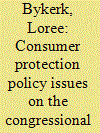

|
|
|
|
|
| Publication |
2011.
|
| Summary/Abstract |
Loree Bykerk and Ardith Maney look at how consumer protection policy fared under the conservative congresses of recent decades. They argue that although the congressional forum open to consumer protection issues remained stable, consumer advocates and their allies were significantly more outnumbered by producer interests than they were before the Republican takeover of the House in 1995
|
|
|
|
|
|
|
|
|
|
|
|
|
|
|
|
| 4 |
ID:
174488
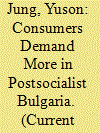

|
|
|
|
|
| Summary/Abstract |
What do consumer rights actually mean in a context in which citizens are unsure whether there is even a functioning judicial system …?
|
|
|
|
|
|
|
|
|
|
|
|
|
|
|
|
| 5 |
ID:
147616


|
|
|
|
|
| Summary/Abstract |
This article quantifies the impact of H7N9 bird flu on chicken demand and consumer willingness to pay (WTP) in China. We measure risk perception, fear and trust against actual reduction in consumption and stated change in WTP for safe chicken between 2012 and 2013. Through a survey conducted in each year on the same Chinese urban consumers, we found that the consumption of chicken never increased after the emergence of H7N9 in 2013, and WTP for safe chicken did not necessarily increase relative to generic risks associated with consuming chicken in 2012. Factors such as the fear of H7N9's spreading, the impact of distrust (especially the distrust in government) enhanced the deviation of consumption and WTP; and the sheer mentioning of H7N9 is more important and negative than whether it was associated with a risk-perception reducing or risk-perception elevating message given to consumers.
|
|
|
|
|
|
|
|
|
|
|
|
|
|
|
|
| 6 |
ID:
084898


|
|
|
| 7 |
ID:
105772


|
|
|
|
|
| Publication |
2011.
|
| Summary/Abstract |
Orissa is the first state in India to have undergone reform in the power sector, with the government withdrawing its control. The model of this reform is known as the WB-Orissa model. The goal of this paper is to examine the impact of this reform on consumers of electricity, which has been measured using multiple regression models. The variables represent the parameters that consumers are most interested in, and the regression coefficients represent the weights of the corresponding variables. The data were collected using a survey methodology. The impact of reform was found to be mixed. Some groups of consumers saw benefits, while others felt a negative impact. A focus group study was conducted to identify the variables of interest to consumers of electricity. The model was used to estimate consumer benefit and was validated using primary data and structural equation modeling. The study revealed beneficial aspects of reform and areas with no benefits.
|
|
|
|
|
|
|
|
|
|
|
|
|
|
|
|
| 8 |
ID:
088992
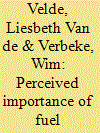

|
|
|
|
|
| Publication |
2009.
|
| Summary/Abstract |
Consumer consciousness concerning the environment has increased and become a major factor in purchasing behaviour. Consumer research to understand and influence the adoption of green technologies and products is therefore important. This paper investigates the beliefs of Belgian consumers concerning the use of biofuels and identifies four consumer segments based on the perceived importance of different fuel characteristics. To convince the performance-oriented consumers to use biofuels, information about these fuels has to stress their quality and performance standards. The society-oriented cluster attaches great importance to environmental friendliness, odour, production origin, the opportunity to decrease energy dependency and job creation. To persuade the environment-oriented consumers low odour, beneficial environmental influence and quality assurance of biofuels have to be emphasized. The convenience-oriented consumers will be the most difficult to persuade to use biofuels. They need to be convinced that every vehicle can drive with biofuel blends without the need for engine modifications. Concerns relating to the price and perceived low availability of biofuels at fuel stations are major obstacles for all consumers involved in this study.
|
|
|
|
|
|
|
|
|
|
|
|
|
|
|
|
| 9 |
ID:
192717
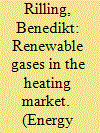

|
|
|
|
|
| Summary/Abstract |
Renewable gases like biomethane or Synthetic Natural Gas (SNG) can play an important role in short-to mid-term decarbonization of the residential heating sector. By (partially) replacing the dominant natural gas, they accomplish two major goals: lowering CO2 emissions and lessening import dependencies. While existing research points to great production potential and technical options for producing renewable gases, the demand side has largely been neglected. Yet consumer decision making is highly relevant for climate change mitigation. Against this backdrop, we conducted a Discrete Choice Experiment with 512 heating consumers in Germany, a country with a high dependency on natural gas. We decomposed the gas tariff into six attributes (share of renewable gas, labels, regionality, biomethane feedstock, supplier type, and price) with varying attribute levels.
|
|
|
|
|
|
|
|
|
|
|
|
|
|
|
|
|
|
|
|
|